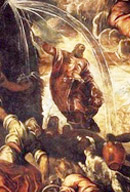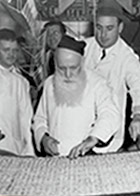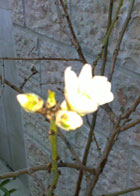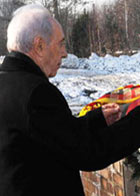Sabbath & Holidays
 Why Was Moses Punished?
Why Was Moses Punished?Wednesday, June 16, 2010 by David Hazony | Jewish Ideas Daily » Daily Features
It comes in the Torah portion read this Saturday (Hukat, Numbers 19:1 - 22:1), and it is unquestionably the lowest point in Moses' career. After dragging the Hebrew slaves out of Egypt, giving them the Ten Commandments, overthrowing the Golden Calf, and braving their never-ending backsliding, complaints, and pleas to return to Egypt, Moses is asked by God to perform one more miracle in response to the Israelites' evidently unquenchable thirst. "And the Lord spoke to Moses, saying, ‘Take the rod, and gather the assembly together . . . and speak to the rock before their eyes; and it shall give...
 Thoroughly Modern Matzah
Thoroughly Modern MatzahThursday, March 25, 2010 | Jewish Ideas Daily » Daily Features
When Jews the world over sit down next week to mark the birth of Jewish history, matzah will figure prominently at the table. Matzah baking is an exacting task; according to traditional law, the entire process, from first kneading to exit from the oven, must be accomplished in 18 minutes flat, with not a speck of leaven in sight. For thousands of years, these specifications and others were laboriously met by hand. Yet this most ancient food has a modern history, too. The first matzah machine was invented in 1838 in France. With rabbinic approval, the technology moved steadily eastward. The...
 Eruv
EruvOne of the more obscure municipal systems knocked out of commission by late February's blizzards along the Atlantic seaboard were eruvim. These, as the New York Times explained, are networks of poles and wires that construct symbolic boundaries around Jewish communities, thus enabling the observant to carry objects through outdoor public spaces on the Sabbath. The prohibition against carrying is of ancient vintage, attested in the book of Jeremiah (17:21-22): ". . . and bear no burden on the Sabbath day, nor bring it in by the gates of Jerusalem; neither carry forth a burden out of your houses." The Talmud (Shabbat...
 Judaica by Design
Judaica by DesignWednesday, February 17, 2010 | Jewish Ideas Daily » Daily Features
"Art for art's sake"—the idea that works of art must be judged solely on their own terms, apart from any considerations of moral, religious, or civic value—has by now become largely devoid of meaning, especially as so many artists openly hitch their work to one or another of today's political wagons. But with the lapsing of the polarities to which the phrase once gave rise, in particular those between art and religion, it has also become possible for newer generations of artists to turn their talents unapologetically to religious motifs. The results, as several recent exhibits suggest, are both intriguing and markedly uneven. Reinventing Ritual, a show from last fall at the...
 Tu b’Shevat: What Sorts of Trees are We?
Tu b’Shevat: What Sorts of Trees are We?Friday, January 29, 2010 | Jewish Ideas Daily » Daily Features
Deuteronomy 20, discussing the laws of war, and in particular siege, forbids the cutting down of fruit trees, adding, in an ambiguous and tantalizing phrase, "ki ha-adam etz ha-sadeh." The words can be translated as a simple if enigmatic statement ("for man is a tree of the field") or as a question (in the rendering of the JPS Torah,"are trees of the field human?"). The classical commentators were likewise divided. The Talmud, reading the phrase as a statement, is moved to offer a prototype of a human "tree of the field": a virtuous sage, a worthy teacher and role model. Rashi, the...
 Holocaust Days
Holocaust DaysThursday, January 28, 2010 | Jewish Ideas Daily » Daily Features
Yesterday, Shimon Peres delivered an address, in Hebrew, before the Bundestag as Germany and other nations marked International Holocaust Day, commemorating the date in 1945 when Soviet forces arrived at Auschwitz. Israeli and American Jews conduct their own Holocaust remembrances in the spring, on the anniversary of the Warsaw Ghetto uprising. Ultra-Orthodox Jews, uneasy with the Zionist emphasis on force and resistance, hold their memorials on the tenth of Tevet, one of the traditional fast days for the destruction of the Temple. In short, the Holocaust remains as open to interpretation, reinterpretation—and misunderstanding—as is the hole it blew through all the history...
 Temple & Synagogue
Temple & SynagogueWednesday, December 16, 2009 | Jewish Ideas Daily » Daily Features
The structure defiled by the pagan Greeks in the rabbinic story of the miracle of Hanukkah was a replacement building for the First (Solomon’s) Temple, destroyed by the Babylonians in 586 B.C.E. The replacement was itself replaced by the magnificent Second Temple, completed by King Herod around 20 B.C.E. and in turn destroyed by the Romans 90 years later. By then, the centralized model of Temple worship with its sacrifices had already begun to be supplanted by prayer worship in small synagogues both inside and outside the Holy Land. Although the precise architecture of Solomon’s Temple can only be guessed at,...
 Who Can Retell?
Who Can Retell?Tuesday, December 15, 2009 | Jewish Ideas Daily » Daily Features
Among the holidays of the Jewish year, Hanukkah may surpass even Passover in the sheer number and variety of the songs devoted to recalling, retelling, and rejoicing in the events of the past and their evergreen message. For American Jews of a certain age nostalgic for their childhood, Diane Ashton deftly surveys the English-language ditties of the 1950’s, from “Who Can Retell” to “I Had a Little Dreydl” and beyond. Today’s casual consumers have their pick of dozens of new CD’s in English, Yinglish, and Hebrew, folk, rock, and heavy metal, many of them rivaling the Christmas market for kitsch. But...
 Festival of Lights
Festival of LightsMonday, December 7, 2009 | Jewish Ideas Daily » Daily Features
Hanukkah, the eight-day holiday whose Hebrew dates are 25 Kislev - 2 Tevet, begins this year on the evening of December 11. It commemorates an ancient victory at once military, political, social, and religious. Militarily, the victory, which took place in Judea in 165 B.C.E., saw the routing of the forces of the Greek Seleucid king Antiochus Epiphanes by a rebel Jewish army under the leadership of Judah Maccabee. Politically, it ushered in a prolonged period of independent Jewish rule under the Hasmonean dynasty. Socially, it betokened the triumph of traditionalist Jews over the assimilating Hellenizers in their midst. Religiously,...
Editors' Picks
Snowmageddon Samuel G. Freedman, New York Times. The collapse of eruvim in winter storms has raised interest in a generally unmarked Jewish concept; an American artist sees the enclosures as drawings in space.
The All-Inclusive Holiday Shai Held, Beliefnet. Purim's religious themes comprehend, one by one, the teachings of every other holiday of the Jewish year.
Vashti Up, Esther Down Abby Wisse Schachter, Commentary. Creating a politically correct Purim means crowning a new heroine and trashing the old one.
Mixed Seating and American Jews Shlomo Brody, Jerusalem Post. At one time, even some Orthodox synagogues indulged in the practice; why no longer?
Why Was Esther Childless? Joseph H. Prouser, Conservative Judaism. Hadassah, the Hebrew name of the heroine of the Purim story, means "myrtle." Therein lies a tale.
Why I Observe Two Days of Purim Ari Enkin, Hirhurim. Because he lives in Beit Shemesh, a town in Israel that in the days of Joshua had a wall around it.
Living by the Moon Yoni Kempinski, Arutz Sheva. Report, with video, of a conference on the lunar calendar and Jewish tradition.
My God, Elohai Kobi Oz, YouTube. Discovering tapes of his Tunisian grandfather's self-performed songs of religious devotion, an Israeli singer and band leader enters into a haunting musical dialogue with tradition.
What Judith Did Erica Brown, MyJewishLearning. The legend of a brave and pious woman, and the lessons of Hanukkah.
The Stones Speak Brian Blondy, Jerusalem Post. A newly deciphered inscription verifies the events precipitating the Maccabean Revolt and the story of Hanukkah.

